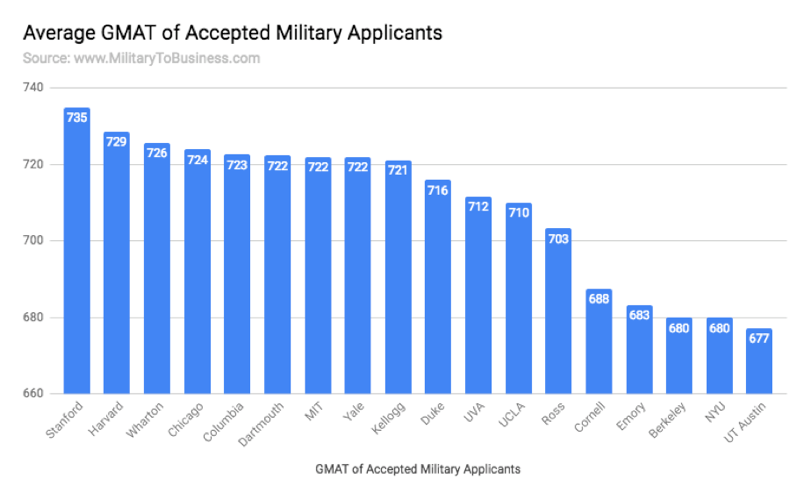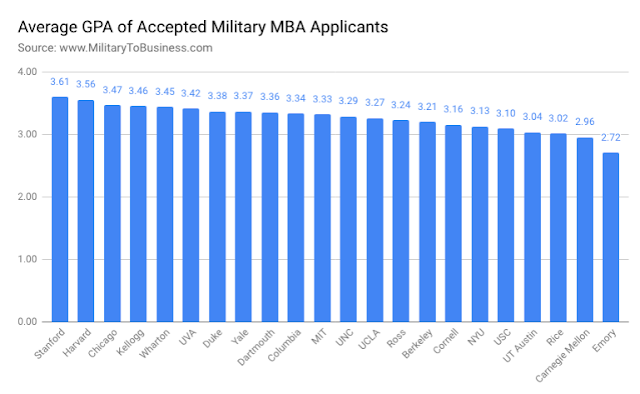Today we host part 2 of a 4 part series on a transition from the military to a top tier MBA. The author of this piece spent 6 months applying to and receiving acceptance from some of the best business schools in the country. The author was accepted to 6 of 7 of the schools he applied to, including the Wharton and Booth Schools of business. His application guide serves as insight for those looking to pursue a similar path. Each post will feature the portions highlighted in bold from the list below. I hope you enjoy this valuable MBA application insight as the application season progresses!
Miss part 1? Click the link here!
MBA application guide for Veterans and Service Members
*Although this guide is targeted towards helping veterans, most of the advice applies to all applicants.
IntroductionRankingsIPB— The Battlefield and The Players- The Veteran Applicant
- Priorities of Work and Timeline
- GRE/GMAT
- Letters of Recommendation
- Resumé
- Essays
- Interview
- Assistance/Resources
- Should I hire a consultant?
- Paying for School
- What schools should I apply to?
The Veteran Applicant
Military commissioned and non-commissioned officers rank as the second most respected profession in our society–behind doctors according to a number of polls. This regard puts veteran applicants in a position of strength.
MBA programs are looking for leaders. The zinger is, because you are a veteran, the admissions committee is already giving you credit for leadership and the ability to perform under pressure. Be sure to emphasize your leadership experiences but don’t waste space where you can show other attributes.
MBA programs are looking for well-rounded applicants. You want to humanize yourself and show who you are behind the uniform…. it’s certainly inadvisable to perform facing movements as you march into the interview room. The mistake many military applicants make is that they present themselves as one dimensional. Since you have already proven your leadership ability through a successful military career, spend more time emphasizing your analytical ability, ability to empathize with others, selfless service to the community, and how you foster diversity and inclusion within your organization.
As we have already noted in part 1, you compete in a bucket of other military applicants. The headwind or tailwind facing military applicants is distinguishing themselves from the pack. Military promotions and pay are standardized and based on seniority; therefore, it’s hard to set yourself apart in this regard. Job titles and descriptions suffer a similar fate. If you are a pilot or come from the Special Operations community, congratulations… you have a tailwind. The admissions committee understands that these communities are “special” and take extra work to get into. It is also something that they can wrap their head around as a civilian with limited military background can understand what it is that you do. For most everyone else, it’s a headwind. Find what’s special or what sets you apart in your career and emphasize it. Maybe it’s your volunteer work, maybe you designed a new innovative process, or maybe you introduced big data into the workplace. Al of these could set you apart from your peers.
To summarize the advice here, identify what makes you unique, define your brand, and ensure that the brand runs like a thread throughout your entire application (resumé, interview, essays). According to MBA Data Guru, military applicants have a ~63% lift for M7 admissions. Additionally, on average, admitted military applicants GPAs are lower by 0.15 points and GMAT scores by 15 points on average. These put you at an advantage to non-military applicants. So go out there and differentiate yourself from your peers!


Priorities of Work and Timeline
Priorities of work are driven by your application timeline. We discussed applying in round 1 versus round 2 in our first post in the series (round 3 is not advisable). Ideally, you have a solid GRE or GMAT score that is competitive for your target school prior to beginning your applications. Keep in mind that increasing your score will likely take time. You may have to take the test 3 or 4 times before being comfortable with your score (a 730 GMAT is the 96th percentile and may take multiple attempts for some).
Additionally, factors such as your GPA, community service, and work experience will play a role in the competitiveness of your application. After achieving a test score that you are comfortable with for applications, you can then begin reaching out to previous supervisors for letters of recommendation, work on your resumé, and then begin essays once your target school releases them. If you are lucky enough to get invited for an interview, that will be your next step after submitting your application. We’ll take a look at the process, starting with the standardized tests below and move onto the remaining steps in our next 2 posts.
The Standardized Test
This is the beginning

The GRE or the GMAT is the hardest part for military applicants—to be honest, it’s the hardest part for everyone. Those on active duty will face an uphill battle to find time to study, and most have not done significant quantitative analysis since college.
This is where you should start, before even reaching out to your school’s Veteran’s Club or Service 2 School. These organizations want to help you, but if you have a 550 GMAT, you should probably consider studying a bit more and retaking the test before reaching out.
GRE or GMAT? Self-reflect on your strengths. If you have a robust vocabulary but weak analytical skills, then the GRE. If you have weak reading comprehension or vocabulary but are great at math, then take the GMAT. If you are not sure, then take a practice test of each and pick the one that you are most comfortable with or scored the best. Select the test you will do the best on. The ADCOM doesn’t care which one you take anymore as long as your score is competitive.
GRE to GMAT comparison calculator: Do not read into it! The calculator lacks in a number of areas. MBA programs have seen enough GRE test scores that they know what a good score is, and they are not going to put it into a calculator.
What is an excellent GMAT Score? The GMAT is more prevalent among applicants. Everyone is always scouring the internet for what minimum score I need to get into X MBA program. Each MBA program will say they holistically look at the applicant. While this is true they still care about test scores because that’s how U.S News is ranking them. Specific to Military applicants applying to M7 schools: If you score below a 680 and you don’t have a miracle achievement somewhere else on your application, you’re probably not getting in. If you score a 700, you should have a powerful application in other metrics. At 720-730, you are at the median of military applicants, and this should be your goal — try to score higher if you have the capacity.
What is an excellent GRE Score? A 320 with a 160/160 split is going to be my suggested minimum score to apply. That said, if you scored a 319, I would still apply. A 324 with a 162/162 Split is a good score. To be highly competitive, you want to score 327 and above.
Writing Score: Get at least a 4.0 on the GRE writing and then prove that you’re a great writer in your essays. They don’t really care that much about your writing score, but something low like a 3.0 is a red flag. The above also applies to the GMAT.
Not only is the ADCOM using these scores to compare you to other candidates, but they are also using it as proof that you can do the work. Your undergraduate GPA and courses can offset a slightly lower test score. If you were a math major with a 4.0 GPA from a quality institution, ADCOMs will understand that you can do the math required for business school.
Now that I know what score I need to get, how do I get there?
The test measures grit as much as intellectual ability. For some, the journey will be much longer. The key is consistency. Monday through Friday, study two hours a day—preferably when you are not mentally exhausted after a long day at work. Take a practice test over the weekend and keep track of the questions you got wrong — and try to use the official practice tests when you can. Understand why you got them wrong, and ensure that you don’t get another question wrong for the same reason. Keeping an error log is suitable for this. Taking full practice tests over the weekend will condition your brain, just like training for a marathon. This way, you will have the stamina to stay engaged throughout the entirety of the actual exam.
Resources to use: If you want to splurge, I recommend the Economist version of GRE/GMAT test prep or Magoosh’s less pricey version. I would also pay the money for the Manhattan Prep App ($40 for three months). This way, if you find yourself in a hurry up and wait situation, you can pivot a frustrating situation into a personal gain. Additionally, the official test preparation services may be worth the money.
Author’s Note: Don’t forget that as an active duty service member, Dantes will pay for you to take the GRE and GMAT once each! This benefit will save you significant money that you can otherwise spend on test preparation!
Parts 3 and 4 will bring you through the remaining portions of the MBA application process. Best of luck to all of the applicants out there! Any suggestions or questions, do not hesitate to leave a comment!
Enjoy the content of this post? Subscribe below to get the latest content delivered to your inbox!
Greetings, not sure if you read and respond these, but you seem to know a lot about the admissions process. I am an active duty officer with 8 years in the Army as a signal officer looking to put Round 2 MBA applications in and transition out of the military this summer. I scored a 320 on the GRE with a 150Q/170V 5.0 AWA split. This is my third time re-taking this test. Do you think I should (or must) re-take again it or do you think I could at least get an interview at a T10 MBA program with that score? I am interested in Michigan-Ross, Wharton, and HBS.
I have a 3.45 undergrad GPA in History and a 3.91 GPA for my MA in International Relations from the University of Arizona and the University of Oklahoma, respectively.
I was stationed in Korea for 2 years and Germany for 3 years. My current assignment is as an ROTC APMS at Washington University, St. Louis.
Extra Curricular activities include: Army Combatives; Brazilian Jiujitsu; Golf; and I lead a group bible study every other week. Thanks for any insight!
LikeLike
Want to shoot me an email at Jonathan.leesc@gmail.com and go from there? Happy to help. I also have a few friends at Ross right now.
LikeLike